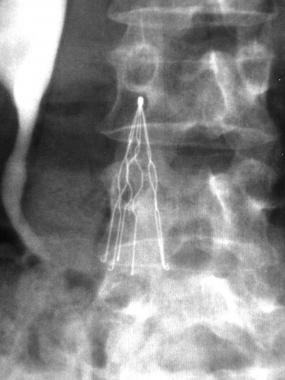A new MDL (multidistrict lawsuit) has been established in the U.S. District Court, District of Arizona, for all federal Bard IVC filter lawsuits filed by or on behalf of patients who allege to have been injured by the Recovery and G2 inferior vena cava (IVC) filters manufactured by C.R. Bard, Inc.
Pursuant to an order of August 17, 2015 almost two dozen Bard IVC filter cases were transferred to the District of Arizona by the U.S. Judicial Panel on Multidistrict Litigation (JPML) after it was determined that centralization will help avoid duplicative discovery and promote a quicker resolution of the cases. According to court documents, the lawsuits share common questions of fact and similar allegations, including design defects that make Bard IVC filters more likely to fracture, migrate, tilt, or perforate the inferior vena cava, causing serious injury to patients.
Problems with IVC Filters
C.R. Bard’s Recovery and G2 IVC filters are designed to catch blood clots and prevent them from making their way to the lungs where they could potentially cause a pulmonary embolism. But problems with the filters prompted hundreds of adverse reports to the U.S. Food and Drug Administration (FDA). In August 2010, the FDA announced a warning about the risks surrounding IVC filters, particularly when the devices broke apart and traveled to other areas of the body and caused perforations and other serious injuries.
Most IVC filters are never removed because insufficient clinical follow-up, failed retrieval procedures, or because patients are not offered the opportunity for filter removal. In May 2014, the FDA recommended that doctors remove IVC filters within a month or two after the risk of pulmonary embolism had passed, and not leave them in place indefinitely, noting that many doctors were not adequately warned about the importance of retrieving the devices. The FDA further stated:
Recommendations/Actions:
The FDA recommends that implanting physicians and clinicians responsible for the ongoing care of patients with retrievable IVC filters consider removing the filter as soon as protection from pulmonary embolism is no longer needed.The FDA encourages all physicians involved in the treatment and follow-up of patients receiving IVC filters to consider the risks and benefits of filter removal for each patient. A patient should be referred for IVC filter removal when the risk/benefit profile favors removal and the procedure is feasible given the patient’s health status.
Contact Childers, Schlueter & Smith Today
Device manufacturers’ first responsibility is to the safety of the people using their product – it is up to them to ensure that a medical device is fit for use by the public.
When you’ve been harmed by a medical device, you need legal advice from attorneys who have experience standing up to negligent manufacturers and know how to hold them accountable for their products. We pursue nothing less than full compensation for your injuries, and that includes everything – medical expenses, physical rehabilitation, lost wages and pain and suffering.
Call Childers, Schlueter & Smith today or fill out the form on the page to speak with a lawyer who can advise you on the best course of action to take going forward. Our case evaluations are always free, and are always focused on what’s best for our clients.
Other IVC Filter Lawsuits News
An Arizona judge denied class certification for Bard IVC filter lawsuits, citing differences among plaintiffs' devices and claims. These lawsuits allege serious injuries from defective IVC filters and insufficient risk warnings.
A new study suggests IVC filters may increase pulmonary embolism risks in traumatic spine injury patients, raising concerns about their safety compared to other preventive treatments.
Studies reveal that Cook Medical’s Celect IVC filters may puncture the vena cava within two months, leading to serious complications and fueling thousands of lawsuits alleging defective design and failure to warn.
A recent study suggests IVC filters may be overused in managed care, often left in place longer than FDA guidelines recommend, raising concerns about patient safety and medical oversight.
Many IVC filters remain in patients indefinitely despite FDA recommendations for removal, raising concerns about serious complications such as fracture, migration, and vena cava perforation.
A new bellwether schedule has been issued in Bard IVC filter litigation, as thousands of lawsuits move forward alleging serious complications linked to the company’s retrievable devices.







